Cybersecurity or information technology security is the safeguarding of computer systems and networks against information leakage, theft or damage. The damage can be induced to their hardware, software or electronic data.

Many companies, especially those that are not in the IT niche, fall behind when it comes to cybersecurity measures. Their security systems are outdated, their employees are not trained to recognize attacks or the possibility of the data breach is not taken seriously just because some measures are in place.
While all companies can benefit from improving their cybersecurity, companies in certain industries are more vulnerable than others. Companies in these industries are most in need of stronger cybersecurity. The industries that need stronger cybersecurity in 2023 are discussed below.
Table of Contents
1. Energy and Utilities

The energy and utilities industry includes businesses that supply essential services such as water, sewage, electricity, dams and natural gas. This industry is at the top of the list because these services are considered by many to be most vital to modern life.
The convenience of online tools made the energy industry more internet-dependent than ever before. It is now possible to pay your utility bills, see your energy expenditure and more all online. With all that information, it is easy to see how someone could take advantage of a weak security system to access someone else’s information or to alter the amount they would have to pay.
Not only is there more personal information available, but numerous variables are controlled online. For example, there was a breach in the water supply system which caused increased amounts of sodium dioxide in water. This could have been harmful to anyone who consumed the contaminated water. Breaches in the security of power grids could leave neighborhoods or entire cities without power. Just from these two examples, it is clear why the energy and utilities industry needs stronger cybersecurity.
2. Healthcare
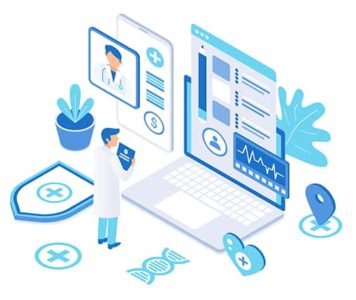
The healthcare industry is a conglomeration of economic sectors that supply services, tools and medicine to patients for curative and preventative care, as well as for rehabilitation.
Cybersecurity in healthcare entails safeguarding electronic information and assets against illegal access, use and disclosure. If someone was to access a healthcare system, they would be able to get the private legal information of patients, their therapies, health problems and much more.
Note:
There are several reasons why better cybersecurity is necessary. The main threats are malware and distributed denial of service (DDoS) attacks. These threats can result in damage to the facilities which then will not be able to provide healthcare to patients.3. Financial Services
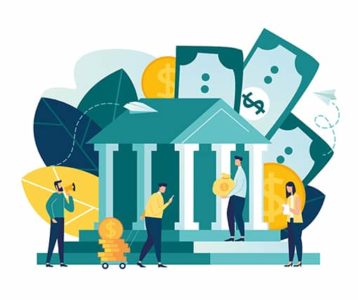
This sector of the economy includes a wide range of financial institutions, such as banks, investment businesses, real estate agents and insurance organizations. They provide financial services, which often require insurance and banking information from their customers.
Since money is often the motivator for cyber attacks, the financial services industry is on constant lookout for data breaches. For this reason, the financial services industry has long been concerned about maintaining adequate cybersecurity.
Aside from possible data breaches, loss of information from the insurance or banking system can impact customers in a variety of ways. For example, customers will not be able to access their insurance or banking information in a time of need. This can result in the lack of healthcare, necessary documentation, missed deadlines and more.
4. Government

The public sector is a part of the economy that includes public services as well as governmental services like the military, law enforcement, healthcare, public transit, etc.
Since the government has access to invaluable information that is unknown to the public, it is often the target of cyberattacks, both domestic and foreign. Leaning on outside contractors is another threat to the government since it relinquishes control over assets that aid in the maintenance of national security.
The first consequence of cyberattacks is the loss of trust that the public has for the government. Moreover, cyberattacks can derail important investigations and allow criminals to access highly sensitive information. Attacks on government institutions affect both organizations and individuals.
5. Manufacturing
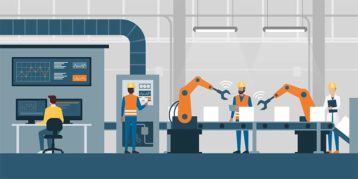
The manufacturing industry produces items by utilizing labor, machinery, tools and chemical or biological processing. The process of producing an item takes a lot of time, energy and labor. Given the nature of the process, numerous companies, outside contractors and factories are included in the process, which makes access to private information easier.
The manufacturing industry has invaluable data, prototypes and technology information, as well as customers’ financial information. Data breaches of the manufacturing industry can lead to ransom and loss of money for both companies and customers. Moreover, manufacturing often works with new technologies but is sometimes inexperienced in the risks that they may carry, making them an easy target.
6. Retail
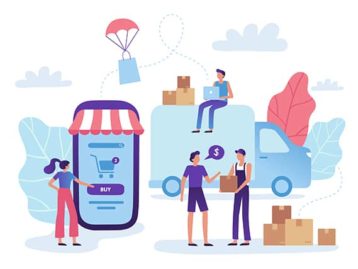
Retail is the practice of making a profit by selling consumer products or services to clients through numerous channels of distribution. Retailers sell a variety of products and services on a daily basis, working with thousands of people and requesting their information to complete their payments.
Many retailers handle large networks of stores distributed worldwide, each of which collects personal information. This means that there is a wide range of entry points for hackers.
Note:
A weak cybersecurity system can lead to hackers accessing customers’ card information, CVVs, account information and much more. Such attacks damage retail chains and stores by causing financial and information losses. These attacks can also expose the information of both employees and customers and can damage the reputation of the retailers.7. Construction

The construction industry includes businesses that create structures such as bridges, buildings and roads. It also includes the renovation of such structures. According to a report released by Safety Detective, the construction industry is the third most vulnerable to ransomware assaults.
The construction industry is vulnerable to cyberattacks due to the volume of messages that companies receive. The coordination between workers, project managers, companies and outside contractors often happens via email, making the whole industry a fertile ground for phishing attacks.
8. Marketing and Media

The media industry may be characterized as a diverse group of organizations that work together to create, publish and distribute media content. The marketing industry’s goal is to convey a company’s services to consumers, clients and the broader public.
Since they are the industries where endless pieces of information are collected and distributed, marketing and media are not only at risk of ransomware attacks. There are numerous people who provide the materials, outside contractors that write the articles, shoot videos, gather information, etc. Each of those people and all of their devices are entry points for malicious hackers.
With so many potentially unsecured devices included in the process, and with the marketing and media industries transitioning online in the past couple of years, the threat of leaving the information bare for hackers to access is significant.
Note:
Inadequate cybersecurity protocols in the marketing and media industry can lead to ransomware attacks, DDoS attacks, using platforms with large amounts of traffic for political agenda, media blackouts and much more. For this reason, it is important for media and marketing companies to keep their cybersecurity systems up-to-date to stay ahead of hackers.9. Logistics
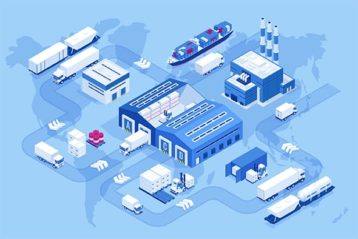
The logistics industry is responsible for gathering materials, producing materials and organizing the transport of the appropriate quantities of needed goods to their proper location. Usually the materials need to be delivered in time so that a certain building or a product can be made.
Like other industries, logistics has numerous people and companies involved in the process. The interconnectedness of the system is necessary due to the volume and scope of the work, but this network of connections is also the cause of the threat.
The logistics industry is at risk of phishing, malware and DDoS attacks. Lack of security can cause delays in the delivery of medicine, construction materials, food and virtually any other type of item. Delays can cause damage to the transported goods, to the people that needed them, as well as the sender and receiver organizations.
10. Insurance

The insurance industry offers risk management services in terms of contracts that promise payment if an unforeseeable event happens. To make a deal with an insurance company, you will need to provide personal information that those companies will store for inside use. The large amount of personal data and banking information stored by the insurance industry is the reason for frequent cyberattacks.
Nowadays, it is possible to get insurance online, which means that customers might be leaving their information exposed for hackers to see due to unsafe websites and unencrypted data. This calls for better security systems and insurance applications that will provide safety for clients’ data.
Due to the scale and complexity of the insurance industry, as well as the huge volumes of data used by enterprises in this sector, cybersecurity is critical. Insurance companies are vulnerable to all kinds of cyberattacks: ransomware, malware, DDoS attacks and phishing, to name the most common types.
11. Education

The education industry is made up of institutions whose primary goal is to deliver education. These institutions can be public, non-profit or for-profit. They provide services such as courses and degrees and offer free educational opportunities.
With numerous devices belonging to the professors, students, their parents and staff being interconnected, cybersecurity in the education industry should be at a much higher level than it is now. All those involved are at risk of DDoS attacks, data and financial theft, ransomware, malware and spyware.
Note:
Lack of security in the education sector can cause disruptions of the institutions, as well as ransomware attacks on the employees and students. The main threat and biggest risk of such events are the attacks on minors where their photographs, places of residence and other personal information can be inappropriately used.Is Cybersecurity Defined the Same for Every Industry?
The definition of cybersecurity is the use of technology and policies to defend against cyber attacks on devices, networks and data. Regardless of the differences between the industries, cybersecurity is defined the same. They all need to protect the company and customers’ data.
Cybersecurity importance is paramount to keeping personal information truly personal. The following list discusses the benefits of cybersecurity systems:
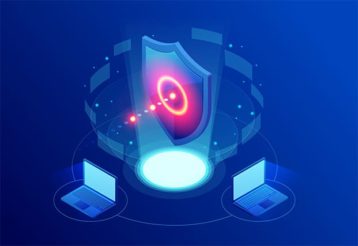
- Prevents unauthorized access to networks and personal/financial data.
- Increased stakeholder trust.
- Protection against viruses, spyware and other malicious software.
- Preventing system crashes.
- Keeping the whole network safe.
There are numerous reasons to incorporate a strong security system within any organization, but the main reason is the safety of customers that put their trust in the companies and their services. Being able to maintain a customer’s trust is invaluable to a company, especially when the company is in an industry that is often a target of cyberattacks.
Cybersecurity-related industries are those that store large amounts of information and those that have numerous outside contractors whose devices are not. This includes the media and marketing industry as well as all of the other industries discussed above.
Why Do Companies Need Cybersecurity?
Cybersecurity is important because it protects all categories of data from theft and damage. Companies need cybersecurity to function flawlessly, as well as to maintain the trust of their customers and the safety of their employees. Industrial cybersecurity uses both traditional and modern engineering methods to keep the industrial processes running, which highlights the necessity of industrial cybersecurity. For example, the construction industry and cybersecurity should be inseparable: blueprints of safety buildings should be kept private at any cost.What Are the Types of Cyber Attacks on Businesses?
The following list discusses the types of cyber attacks on businesses:
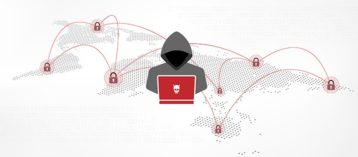
- Data theft: Since companies usually store large amounts of data and personal information on their customers and employees, this makes them a target for data theft attacks. These attacks include identity theft, theft of banking information and generally include any instance of a hacker collecting important bits of personally identifiable information.
- Phishing: Phishing attacks are achieved through emails and messengers when a hacker sends a link that the targeted person clicks. This click causes the malware to download or it leads to the page where the targeted person can enter private information.
There are two reasons why phishing is one of the most frequent types of cyberattacks on businesses:
1. Big networks, systems and organizations such as companies are always in contact with numerous other organizations and people.
2. Employees are not frequently educated about how to recognize phishing attacks.
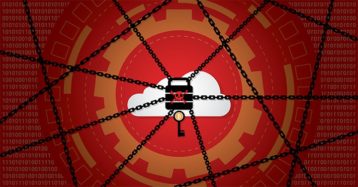
- Ransomware: Ransomware is a type of malware that encrypts files on a target’s device, which can lead to the data being locked or unreachable. Then the hacker requires a ransom, often in the form of cryptocurrency, to unlock the data.
- Spyware: Spyware is another type of malware that works in the background and monitors the target’s behavior on an infected device.
- DDoS Attacks: When a DDoS attack happens, hackers overwhelm the network and cause crashes, making it temporarily unavailable for use.
How Companies Prevent Cyber Attacks
The following list discusses prevention methods against cyber attacks that companies use:
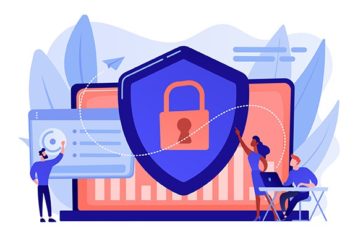
- Limiting employee access: By limiting employee access to important information, the company minimizes the number of entry points for hackers.
- Installing antivirus software: Antivirus software detects, blocks and deletes Trojans, viruses and even phishing attacks.
- Updating operating systems and antivirus software: Updates not only remove bugs but also update the databases of security systems so they can act on the newest threats.
- Backing up data: In the case of a crash or data theft, the hacker might delete the files. To have access to the files again, companies perform monthly, weekly or daily backups.
- Employee education: Numerous companies educate their employees on how to recognize phishing attacks and what to do in the case of a DDoS attack.
What Are the Best Tools for Cybersecurity?
The following list discusses the best tools for cybersecurity:
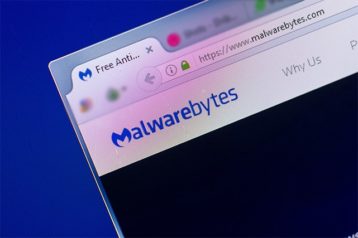
- Malwarebytes: This is a cyber security tool that protects devices against various types of malware, viruses, Trojans and ransomware. It provides safe browsing, detects and removes numerous threats daily and can perform a privacy audit on any program or app.
- Bitdefender: This is a cloud-based antivirus software that keeps devices safe from various types of threats while leaving the working memory free and minimally affecting battery life. It has a VPN service, performs 24/7 updates and provides additional security for online banking.
- AVG Antivirus Business Edition: AVG is a user-friendly antivirus software that will detect and remove spyware, viruses and malware.
- Intruder: Intruder is an online scanner that detects weaknesses in the device’s and network’s security system.
- Acunetix: This is an antivirus software for small- to medium-sized businesses that can prevent data breaches.

